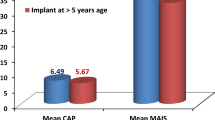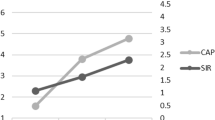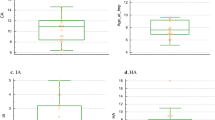Abstract
Cochlear implantation (CI) is used in management of children with bilateral severe to profound sensorineural hearing loss (SNHL). Recently, due to technological advancements, more and more infants and toddlers are undertaking the CI. The age at implantation may have an impact on CI outcomes. The primary aim of this study was to determine the long-term impact of ‘age at implantation’ on Health Related Quality of Life (HRQoL) outcome post-CI. In this prospective study at a tertiary care centre, we evaluated 50 CI recipient children from 2011 to 2018. Group A consisted of 35 (70%) children who received CI at less than or equal to 5 years of age and Group B with 15 (30%) children who underwent CI at more than 5 years of age. Following CI, all children received auditory-verbal therapy and thereafter we evaluated their long-term HRQoL outcomes at 5 years post-CI. Children were assessed by Nijmegen Cochlear Implant Questionnaire (NCIQ) and Children with cochlear implants: parental perspectives-questionnaire (CCIPPQ). There were significantly improved HRQoL outcomes (with an increase of 11.7% in mean NCIQ and 11.4% in mean CCIPPQ scores) at 5 years post-CI in CI recipients of age group ‘5 years or less’ as compared to those who underwent CI at ‘more than 5 years’ age [P value < 0.05 for both the mean NCIQ scores and mean CCIPPQ scores respectively]. However, for children with ‘more than 5 years’ age at implantation, mean NCIQ and CCIPPQ scores were still more than 80% of maximum achievable NCIQ and CCIPPQ scores. In this study, CI recipient children who were implanted at less than or equal to 5 years of age were found to have significantly improved HRQoL outcomes at 5 years post-CI. Hence, it seems desirable to provide CI at an early age. However, even in children who received CI at more than 5 years of age, there was a substantial enhancement in HRQoL outcomes and CI was still effective in these children. Hence, knowledge of ‘age at implantation’ may provide reasonable assistance in predicting the HRQoL outcomes and optimal counseling of parents and families of CI candidates.

Similar content being viewed by others
References
Loeffler C, Aschendorff A, Burger T et al (2010) Quality of life measurements after cochlear implantation. Open Otorhinolaryngol J 4:47–54
Nikolopoulos H, Lloyd SM, Archbold GM, Donoghue O (2001) Pediatric cochlear implantation: the parent’s perspective. Arch Otolaryngol Head Neck Surg 127(4):363–7
Fitzpatrick R, Davey C, Buxton MJ, Jones DR (1998) Evaluating patient based outcome measures for use in clinical trials. Health Technol Assess (Winchester, England) 2(14):41–74
Guyatt GH, Feeney DH, Patrick DL (1993) Measuring health related quality of life. Ann Intern Med 118:622–623
Sanders C, Egger M, Donovan J, Tallon D, Frankel S (1998) Reporting on quality of life in randomised controlled trials: bibliographic study. BMJ (Clin Res) 317(7167):1191–4
Bess F (2000) The role of generic health-related quality of life measures in establishing audiological rehabilitation outcomes. Ear Hear 21:S74-79
Carney AE, Moeller MP (1998) Treatment efficacy: hearing loss in children. J Speech Lang Hear Res 41(1):S61-84
Necula V, Cosgarea M, Necula SE (2013) Health-related quality of life in cochlear implanted patients in Romania. Int J Pediatr Otorhinolaryngol 77:216–222
Fortunato-Tavares T, Befi-Lopes D, Bento RF, De-Andrade CRF (2012) Children with cochlear implants: communication skills and quality of life. Braz J Otorhinolaryngol 78:15–25
Huttunen K, Rimmanen S, Vikman S et al (2009) Parents’ views on the quality of life of their children 2–3 years after cochlear implantation. Int J Pediatr Otorhinolaryngol 73:1786–1794
Osberger M (1998) Speech recognition performance of older children with cochlear implants. Am J Otol 19:152–157
Hirschfelder A, Grabel S, Olze H (2008) The impact of cochlear implantation on quality of life: the role of audiologic performance and variables. Otolaryngol Head Neck Surg 138(3):357–362
Hinderink JB, Krabbe PF, Van-Den-Broek P (2000) Development and application of a health-related quality-of-life instrument for adults with cochlear implants: the Nijmegen cochlear implant questionnaire. Otolaryngol Head Neck Surg 123(6):756–765
Archbold M, Lutman S, Gregory C et al (2002) Parents and their deaf child: their perceptions three years after cochlear implantation. Deaf Educ Int 4(1):12–40
Nunes T, Pretzlik U, Ilicak S (2005) Validation of a parent outcome questionnaire from pediatric cochlear implantation. J Deaf Stud Deaf Educ 10:330–356
Damen G, Krabbe P, Archbold S, Mylanus E (2007) Evaluation of the Parental Perspective instrument for pediatric cochlear implantation to arrive at a short version. Int J Pediatr Otorhinolaryngol 71(3):425–433
Blamey P, Arndt P, Bergeron F (1996) Factors affecting auditory performance of postlingually deaf adults using cochlear implants. Audiol Neurootol 1:293–306
Holt RF, Svirsky MA (2008) An exploratory look at pediatric cochlear implantation: is earliest always best? Ear Hear 29(4):492–511
Waltzman SB, Roland JT Jr (2005) Cochlear implantation in children younger than 12 months. Pediatrics 116(4):e487–e493
Miyamoto RT, Hay-McCutcheon MJ, Kirk KI et al (2008) Language skills of profoundly deaf children who received cochlear implants under 12 months of age: a preliminary study. Acta Otolaryngol 128(4):373–377
Hammes DM, Novak MA, Rotz LA et al (2002) Early identification and cochlear implantation: critical factors for spoken language development. Ann Otol Rhinol Laryngol Suppl 189:74–78
Arisi E, Forti S, Pagani D et al (2010) Cochlear implantation in adolescents with prelinguistic deafness. Otolaryngol Head Neck Surg 142(6):804–808
Waltzman S, Roland JT, Cohen N (2002) Delayed implantation in congenitally deaf children and adults. Otol Neurotol 23:333–340
Sharma A, Dorman MF (2006) Central auditory development in children with cochlear implants: clinical implications. Adv Otorhinolaryngol 64:66–88
Manrique M, Cervera-Paz FJ, Huarte A et al (2004) Hearing and speech in children under 2 years of age with a cochlear implant. An Sist Sanit Navar 27:305–317
Fisher RA, Nig J (1950) Paediatr statistical methods for research workers. Oliver and Boyd
Kelsay DMR, Tyler RS (1996) Advantages and disadvantages expected and realized by pediatric cochlear implant recipients as reported by parents. Am J Otol 17(6):866–873
Sach TH, Whynes DK (2005) Paediatric cochlear implantation: the views of parents. Int J Audiol 44(7):400–407
Government of India. Ministry of social justice and empowerment (2015). Corrigendum- Guidelines approved for hearing impaired for financial assistance under revised ADIP scheme-modifications regarding [Report No. 4–2 (8)/2014/DD-I]. New Delhi: Department of empowerment of persons with disabilities.
Government of India. Ministry of health and family welfare (2009). Office memorandum – Reimbursement of the cost of cochlear implant to beneficiaries under CGHS/ Central Services (Medical Attendance) Rules, 1944 (File No. 6–469/2003-CGHS/RandH). New Delhi: Department of health and family welfare.
Funding
The authors have no relevant financial or non-financial interests to disclose.
Author information
Authors and Affiliations
Contributions
Dr VG Criteria for inclusion: Concept and design of study, acquisition of data/ analysis and interpretation of data. Dr AKM Criteria for inclusion: Manuscript review and final approval of the version to be published.: Dr SK Criteria for inclusion: Manuscript review.
Corresponding author
Ethics declarations
Conflicts of interest
There are no conflicts of interest.
Ethical approval
All procedures of the study were approved by the childrens’ parents/ guardians and informed consent was taken from parents/ guardians of the children. This study was approved by the hospital ethics committee.
Additional information
Publisher's Note
Springer Nature remains neutral with regard to jurisdictional claims in published maps and institutional affiliations.
Rights and permissions
Springer Nature or its licensor (e.g. a society or other partner) holds exclusive rights to this article under a publishing agreement with the author(s) or other rightsholder(s); author self-archiving of the accepted manuscript version of this article is solely governed by the terms of such publishing agreement and applicable law.
About this article
Cite this article
Gaurav, V., Mishra, A.K. & Karmani, S. Long Term Impact of Age at Implantation on Quality-of-Life Outcomes in Cochlear Implant Recipient Children. Indian J Otolaryngol Head Neck Surg 75 (Suppl 1), 103–111 (2023). https://doi.org/10.1007/s12070-022-03260-5
Received:
Accepted:
Published:
Issue Date:
DOI: https://doi.org/10.1007/s12070-022-03260-5




